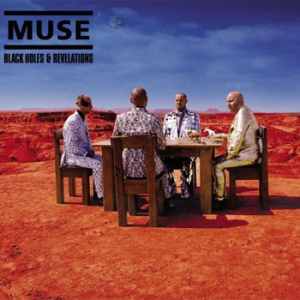
2006-09-02
The Muse lovers adore it, the reviewers praise it, the radio and TV frequently play songs out of it – "Black holes and revelations", Muse's fourth studio effort, is everywhere now; and I, like all the above mentioned individuals, simply can't stop listening to it.
On their fourth album Muse pick up exactly where they left off, this is the natural next step from 2003's critically acclaimed ”Absolution", with the suitable title of "Black holes & revelations" (on the same scale of "Butterflies and Hurricanes", one of the singles from "Absolution" which, in retrospective, was a sign of things to come).
Starting with the intro-like "Take a bow", full of those electronic-effects & arpeggios frontman Matthew Bellamy is so fond of and going all the way to the top. This song has a clear political message but in an era where every other band states its political anti-war/anti-Bush opinions this seems a bit trivial, although it doesn't really offend the song's good status as a perfectly built mood setting opener.
This album is just full of potential hit singles. "Starlight" has now become a grinded number on both radio stations and TV channels, and one can easily see why… regardless of the fact the colossal Warner Bros. Records has something to do with it, it's a great single and somewhat of a title track here in the album; Bellamy sounds sharp and clear, ever-so-emotional in his own unique way while the magical keys accompany the dirty effected bass and simple yet sophisticated drumwork – I just can't get it out of my head.
Same story with the first single, "Supermassive Black Hole", which at first struck me as influenced by non other than former pop star Prince – something I found rather disappointing, since this was my first introduction with the "new muse album" – but after a few more rounds it got stuck in my head and I realized the Prince-resemblance I sensed was well fused with some quality Belgian alternative rock (bands like
dEUS,
Soulwax and
Millionaire come to mind) feeling it has.
More influences come with "Map Of The Problematique" – this time it's
Depeche Mode, a band I can't stand for two main reasons…one is David Gahan's vocals and the other is the ridicules and annoying "80's sound" they posses… well, Muse solved both of those problem in this song (they use the good elements like Multi-layers, gothic-choir-like chorus, electro-music and bombastic drumwork, and left out the bad like Gahan's display and overall sound) and could probably do so in any actual Depeche Mode song anytime.
Moving on to the next four songs, flowing from one to another very naturally, "Soldier's poem" being the smooth oldies-like ballad (resembling to some extent other mellow songs by the band like "Unintended" or "Blackout"), it's follower – "Invincible" – building gradually, with church-like dramatic keyboards and guitar slider on the base of military marsh drumming, until about 2:25 where it takes a turn and becomes more vivid but still leaves some tension – that in turn breaks with the bass lead on 3:23, and from there on it's just pure ecstasy. Ecstasy can also be found in the frantic "Assassin" (it resembles "Stockholm Syndrome" from "Absolution" if you insist on comparing) with the added value of interesting vocal combinations and strong lyrics.
"Exo-Politics", the next track, comes off as having rugged alternative-indie-garage-rock influences (kinda like their early songs or "The Small Print" from "Absolution") and with lyrics revolving around aliens & conspiracy theories it is yet another little treat.
The three remaining tracks deliver just as well, be it "City Of Delusion" with the Zoro-like images it provokes (via the acoustic guitar strumming and Trumpet parts) or the more relaxed, simple and orchestrated, "Hoodoo" which is easily the most emotionally arousing track here and sets the ground for the grand finale with "Knights Of Cydonia" – now here's a song which really provokes images…one particular scene of three particular space cowboys galloping into the sunset on Mars's wilderness.
This has to be the most experimental album Muse has released so far, although "Absolution" is a close second; all the influences and experiments start from the aforementioned opener and are carefully weaved in the right dosage throughout the album – thus making it the most experimental effort as well as the most accessible.
Muse managed to release a contentious album, one with melodies that will remain in people's minds, one that can be reviewed without mentioning
Radiohead even once.
Ofer Vayner
